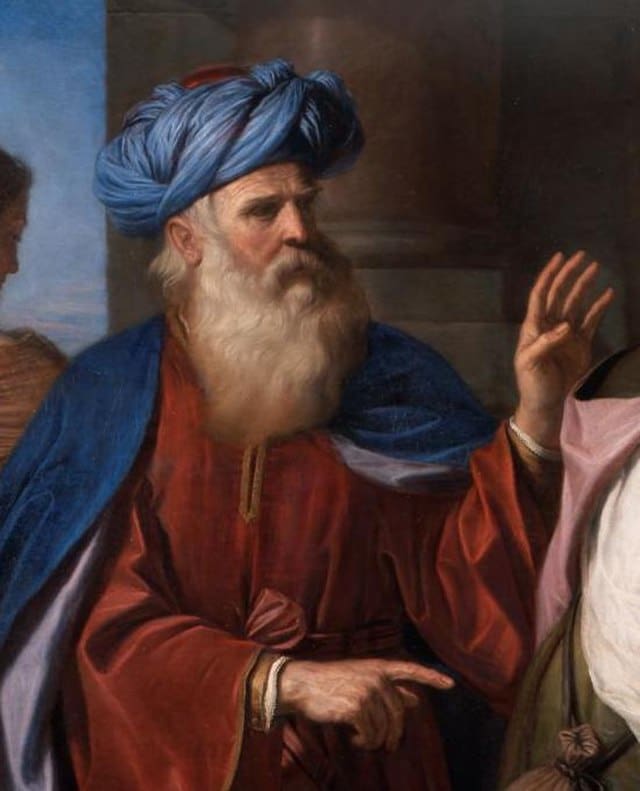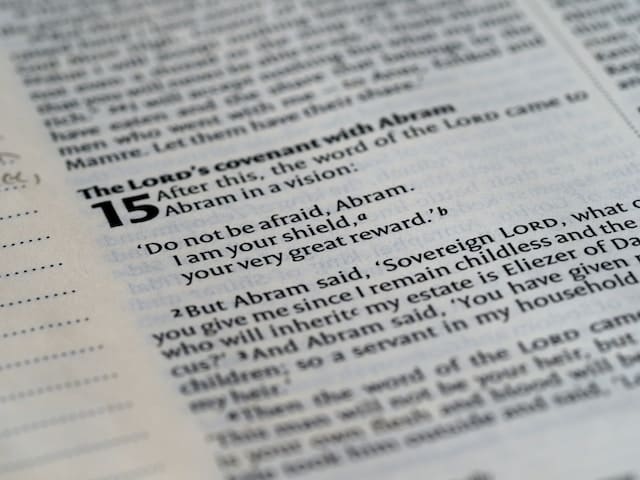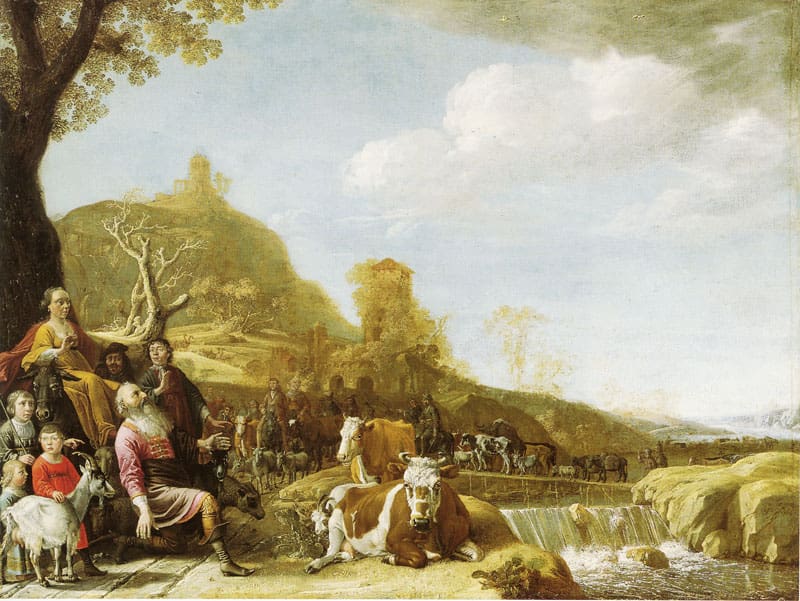Abraham’s Journey: 15 Insights from the Bible’s Patriarch
Abraham is one of the most important figures in the Bible. He is considered to be the patriarch of Judaism and Christianity. He was originally known as Abram but God changed his name to Abraham which means “father of many nations” Abraham was called by God to leave his homeland and journey to the land of Canaan. God promised to bless him and make his descendants into a great nation. At age 75, Abraham was still childless but God promised him that he would have a son and as many descendants as the stars.
It should be noted that Abraham was known for having great faith in God. Even though he was 100 years old when he had a son, he still praised God and thanked him. Scholars note that Abrahan had 6 more sons from Sarah, his wife, and one son through Hagar.
Abraham is a great father figure because he was kind, righteous, obedient, and had great faith. He showed the perfect example of a good Christian because he would always believe that God had a plan for him. No matter what he went through, Abraham believed that God was there and he would guide him.
1. Abraham took a Leap of Faith

Guercino, Public domain, via Wikimedia Commons
When God told Abraham to leave Ur, he listened to him and uprooted his entire life. He ventured into the unknown without a guaranteed destination because he trusted God’s unseen plan. When he left Ur, Abraham defied several societal norms and expectations during the time. Even when he left his home, God never asked Abraham to settle down, He wanted Abraham and his family to wander through unfamiliar lands. It should be noted that Abraham’s story begins when he left Ur. It was the first step of faith he took to reach God’s promises.
2. Abraham persevered in The Face of Challenges
Abraham’s journey with God was filled with both promises and challenges. One of the things he went through was being childless for years. Even though he greatly wanted a son, he refused to doubt God because he knew that he would have many descendants. In Genesis 12:10 and Genesis 13:1, Christians are shown how Abraham’s travels were often driven by hardship.
For Abraham to survive his hardships, he would find solutions to his problems. Abraham also trusted in God’s guidance to lead him to safer grounds. He would often navigate his challenges with a combination of diplomacy and strategic action.
3. He Honored his Commitment to God

Photo by Brett Jordan on Unsplash
Abraham’s commitment to God played a significant role in the Abrahamic tradition. When Abraham was 99 years old, he faithfully fulfilled God’s covenant by circumcising himself and his male descendants. This signified Abraham’s devotion and trust in God’s promise of descendants. Aside from circumcision, Abraham’s actions showed that he honored every commitment he had made to God.
4. He Listened to God’s Divine Guidance
It should be noted that Abraham had a complex and unique relationship with God. According to the Bible, God would talk to Abraham directly in audible words. He would speak to Abraham with clear instructions and promises. In Genesis 18:1-8, Abraham encountered God in physical form through three angels. God would even talk to him through dreams where he would offer Abraham guidance and reassurance. Some traditions suggest that Abraham received confirmation of his choices through their outcomes.
5. Abraham learned from His Mistakes
In Genesis 12:11-13, he recognized his mistake when he passed Sarah off as his sister out of fear. He later takes the blame for what he did to Sarah, this shows how Abraham realized that he shouldn’t have done that just because he was fearful. In Genesis 16:1-4, Abraham agrees to father a child Hagar because Sarah is unable to have children. Even though it was Sarah’s idea, to begin with, many people have shared that Abraham should have refused. Abraham later learns that his decision caused a lifelong conflict which led to him having to send Hagar and Ishmael away.
It should be noted that even though Abraham made several mistakes, God continued to communicate with him. God would offer him guidance and correction through direct commands or prophetic messages. Abraham also listened to advice from Sarah, Abimelech, and Melchizedek.
6. He Embraced Diverse Cultures

Elias van Nijmegen, Public domain, via Wikimedia Commons
In the Biblical narratives, Abraham embraced and interacted with different groups. Since the beginning of his journey, Abraham encountered many groups, he was welcoming and kind. He even established alliances with many groups including nomadic tribes like the Kenites. In Genesis 20:14-18, Abraham hosted and welcomed the Hittite king Abimelech.
7. He saw Family as a Foundation
Abraham’s view of his family as a foundation has been examined through different lenses for years. From God’s perspective, Abraham’s family was chosen to be the foundation for a great nation. However, Abraham’s role was to establish a family that was grounded in faithfulness and obedience to God. Abraham also served as the leader of his family. His actions and choices shaped the family’s identity.
Abraham’s view of his family was to fulfill God’s plan. Some people have noted that his family had several flaws and struggles that shaped them. The tension between Issac and Ishmael was one of the internal complexities that challenged the idea of Abraham’s family being perfect and harmonious.
8. Abraham Trusted in God’s Timing

David Scott, Public domain, via Wikimedia Commons
At the age of 75, Abraham followed God’s instruction and uprooted his life and family to follow His call to an unknown land. This was a great leap of faith that required an immense trust in God’s timing. When Abraham was 100 years old, Sarah miraculously conceived and gave birth to Issac. It should be noted that before Sarah had Issac, Abraham had immense trust in God’s promise of descendants. Abraham offered a powerful lesson in trusting in God’s timing even in impossible situations.
9. He was a Great Model of Hospitality
It should be noted that Abraham was consistently portrayed when he welcomed strangers into his tent and offered them food. He would even go above and beyond to ensure his guests’ comfort and safety. In Genesis 18:6-8, Abraham rushed to prepare a meal, washed the feet of his guests, slaughtered livestock for a feast, and showcased his genuine desire to serve them. Abraham treated travelers, angels, and kings with the same warmth and generosity.
Abraham’s model of hospitality continuously inspires individuals and communities throughout the years. His story encourages us to open our hearts to those in need and create a world where everyone feels accepted and cared for.
10. He had a Passionate Intercessory Power

Paulus Potter, Public domain, via Wikimedia Commons
In the Bible, there a many instances where Abraham prayed for other people like Sodom and Gomorrah. His pleas showcased his concern for people’s well-being and was willing to stand before God on their behalf. In Christianity, prayer for others is highly encouraged. Abraham’s passionate pleas would directly influence God’s decisions. In Genesis 18:23-32, Abraham actively engaged in negotiating with God and even asked for the number of righteous people needed to spare the city. He is seen as an example of the power of intercessory.
11. Abraham Left a legacy in Christianity and Judaism
Abraham is the patriarch of the Jewish people, he was the first to receive God’s covenant. His story in the Torah forms the foundational narrative of Jewish history and identity. Abraham’s actions inspired many Jewish rituals and practices like dietary laws, circumcision, and celebrating the anniversary of Abraham’s covenant.
Christians view Abraham as the “Father of Faith,” a spiritual ancestor whose unwavering trust in God serves as a model for Christian belief. His journey of faith, trials, and obedience is seen as a reflection of the Christian understanding of salvation through faith. His covenant with God is noted as a foreshadowing of the New Covenant that was established by Jesus Christ. His descendants connect him to the Christian narrative of Jesus as the Messiah.
12. He is the Father of Monotheism

Paulus Potter, Public domain, via Wikimedia Commons
Scholars have noted that Abraham was the key figure in the promotion of monotheism within his family and community. In the book of Genesis, Abraham was the first person to break away from polytheism and embrace the worship of one God. His covenant with God and rejection of idols set the stage for the belief system that was later adopted by Judaism and Christianity.
13. Abraham learned the Value of Patience
In the Bible, Abraham had immense patience for God’s promise to have a child. His journey showcased the importance of cultivating genuine patience which is a quality that inspires individuals who are seeking peace and understanding in their own lives.
14. He was Willing to Sacrifice Isaac

Otto Adolph Stemler (1872–1953), Public domain, via Wikimedia Commons
In Genesis 22, God issued a command to Abraham to sacrifice his son as an offering on a mountain. Without hesitation, Abraham gathers wood, binds Issac, and raises the knife to fulfill the sacrifice. At the last moment, an angel stopped Abraham and provided a ram for the sacrifice in place of Issac. The story showed how Abraham had great faith in God.
15. Abraham cultivated a Spirit of Generosity
God’s covenant with Abraham included the promise of abundant blessings and descendants. This sense of abundance might have fostered a natural tendency to share and give back. Abraham’s unwavering faith and gratitude for God’s promises fueled his generosity. He saw himself as a steward of God’s blessings and felt compelled to share them with others in need.
In general, Abraham’s journey is a great example of how patience, trust, and faith in God can elevate you and your family. Abraham was willing to move to unknown places and sacrifice his son because of the faith he had in God’s plan. It should be noted that Abraham shows Christians and Jews how to be good believers.
Planning a trip to Paris ? Get ready !
These are Amazon’s best-selling travel products that you may need for coming to Paris.
Bookstore
- The best travel book : Rick Steves – Paris 2023 – Learn more here
- Fodor’s Paris 2024 – Learn more here
Travel Gear
- Venture Pal Lightweight Backpack – Learn more here
- Samsonite Winfield 2 28″ Luggage – Learn more here
- Swig Savvy’s Stainless Steel Insulated Water Bottle – Learn more here
Check Amazon’s best-seller list for the most popular travel accessories. We sometimes read this list just to find out what new travel products people are buying.









